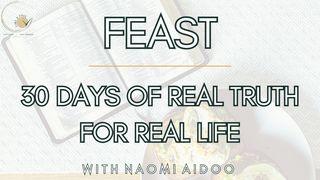Unwavering Conformity: A 21-day Study in StewardshipSample

What's Filling You?
The land is 'full' of human resources - like worldly wisdom, wealth and power. This combination is a classic setup for a chain reaction: those same assets that produce arrogance in us also lead to our failure to trust in God (see Dt 17:14-17). In the words of Quaker writer and founder the colony of Pennsylvania William Penn (1644-1718), 'We are very apt to be full of our selves, instead of Him that made what we so much value; and, but for whom we can have no Reason to value our selves. For we have nothing that we can call our own; no, not our selves: For we are all but Tenants, and at Will too, of the great Lord of our selves, and the rest of this great Farm, the World that we live upon.'
Pastor and author Gordon MacDonald comments on Proverbs 11:4 ('Wealth is worthless in the day of wrath'): 'The day of wrath can refer to that dreaded moment when a city falls to invaders, or it can refer to the coming day when God causes history to cease and judges all of humanity. In either case, wealth held closely and jealously becomes a burden rather than a convenience. The point is simple: Wealth is best held loosely and placed beneath wisdom and righteousness on the priority list.'
As we all know only too well, the quest to extricate ourselves from financial idolatry in a consumer-driven society is anything but simple. Sociologist Robert Wuthnow describes the following scenarios:
The sense that materialism has gotten out-of-hand is magnified by the pressures facing middle-class American families. Home entertainment centers and camcorders can perhaps be passed by, albeit not without the suspicion that one is needlessly denying oneself (and one's children) the small perks that everyone else in the neighborhood is enjoying already. But other material temptations are much more difficult to withstand. High mortgage payments and property taxes may strap the family budget but seem inescapable, not because the amenities of suburban living are so marvelous, but because the public schools anywhere else are in disarray (if not downright dangerous). A new car that costs fifteen times what a new car cost a generation ago is likely to seem equally essential, not so much for the luxurious pleasure of cruising along exotic costal highways, but because an older, inexpensive car turns out to be an even worse bargain, given the fact that the local repair-service franchise not only changes ten times the minimum wage for semiskilled labor but also cheats on repair bills and replaces parts unnecessarily. By the same token, frozen dinners, a microwave oven, a dishwasher, and an illegal immigrant hired to clean the house and take one's cat to the vet would have seemed like the epitome of materialism in another time, but now provide the only means available for two-career couples to work hard enough at their jobs to earn the salaries they need to pay for these labor-saving amenities.
It seems like we are pressured from all sides in this debate. However, the task is not insurmountable. We can moderate our living standard and avoid attitudes that run counter to God's clearly defined will though thoughtful, Spirit-led choices.
The land is 'full' of human resources - like worldly wisdom, wealth and power. This combination is a classic setup for a chain reaction: those same assets that produce arrogance in us also lead to our failure to trust in God (see Dt 17:14-17). In the words of Quaker writer and founder the colony of Pennsylvania William Penn (1644-1718), 'We are very apt to be full of our selves, instead of Him that made what we so much value; and, but for whom we can have no Reason to value our selves. For we have nothing that we can call our own; no, not our selves: For we are all but Tenants, and at Will too, of the great Lord of our selves, and the rest of this great Farm, the World that we live upon.'
Pastor and author Gordon MacDonald comments on Proverbs 11:4 ('Wealth is worthless in the day of wrath'): 'The day of wrath can refer to that dreaded moment when a city falls to invaders, or it can refer to the coming day when God causes history to cease and judges all of humanity. In either case, wealth held closely and jealously becomes a burden rather than a convenience. The point is simple: Wealth is best held loosely and placed beneath wisdom and righteousness on the priority list.'
As we all know only too well, the quest to extricate ourselves from financial idolatry in a consumer-driven society is anything but simple. Sociologist Robert Wuthnow describes the following scenarios:
The sense that materialism has gotten out-of-hand is magnified by the pressures facing middle-class American families. Home entertainment centers and camcorders can perhaps be passed by, albeit not without the suspicion that one is needlessly denying oneself (and one's children) the small perks that everyone else in the neighborhood is enjoying already. But other material temptations are much more difficult to withstand. High mortgage payments and property taxes may strap the family budget but seem inescapable, not because the amenities of suburban living are so marvelous, but because the public schools anywhere else are in disarray (if not downright dangerous). A new car that costs fifteen times what a new car cost a generation ago is likely to seem equally essential, not so much for the luxurious pleasure of cruising along exotic costal highways, but because an older, inexpensive car turns out to be an even worse bargain, given the fact that the local repair-service franchise not only changes ten times the minimum wage for semiskilled labor but also cheats on repair bills and replaces parts unnecessarily. By the same token, frozen dinners, a microwave oven, a dishwasher, and an illegal immigrant hired to clean the house and take one's cat to the vet would have seemed like the epitome of materialism in another time, but now provide the only means available for two-career couples to work hard enough at their jobs to earn the salaries they need to pay for these labor-saving amenities.
It seems like we are pressured from all sides in this debate. However, the task is not insurmountable. We can moderate our living standard and avoid attitudes that run counter to God's clearly defined will though thoughtful, Spirit-led choices.
Scripture
About this Plan

As Christ-followers we acknowledge that Jesus is not only our Savior, but also our Lord. We recognize that everything belongs to Him and that we’re only stewards of His good gifts. Through this plan’s devotional content and brief Scripture readings, you’ll discover that being a good steward of those gifts requires that we become more and more like Him—the essence of conformity.
More
We'd like to thank The Stewardship Council, creators of Zondervan's NIV Stewardship Study Bible, for the structure of Unwavering Conformity: A 21-day Study in Stewardship. For more information about this plan, the NIV Stewardship Study Bible, or hundreds of stewardship resources, please visit their site at http://www.stewardshipcouncil.net/
Related Plans

When Your Child Fails: Turning Your Child’s Mistakes Into Moments of Grace and Growth

Proverbs | Chapter Summaries + Study Questions

Real. Loved. Strengthened: 7 Days With God

Dear Church Wanderer,

What the Bible Says About Thanksgiving, Rejoicing, Generosity, and Blessings

Praying With Assurance: Keys to Profit and Progress

FEAST: 30 Days of Real Truth for Real Life

The Word Is Life

Financial Discipleship – the Bible on Children
